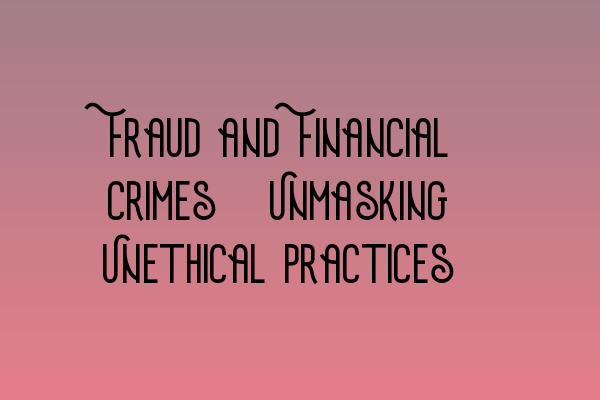Fraud and Financial Crimes: Unmasking Unethical Practices
In today’s complex financial landscape, fraud and financial crimes pose significant challenges to individuals, businesses, and governments alike. Fraudulent activities, such as embezzlement, money laundering, and identity theft, can have devastating consequences for victims and erode the trust within the financial system. It is crucial for professionals and law enforcement agencies to unmask these unethical practices and take decisive action against those responsible.
Understanding Fraud and Financial Crimes
Before delving into the depths of fraudulent activities, it is essential to define fraud and financial crimes accurately. Fraud refers to the intentional deception or misrepresentation made by an individual or organization for personal gain, resulting in financial loss to another party. Financial crimes encompass a broader range of unlawful activities, including fraud, money laundering, bribery, corruption, and insider trading.
To combat these illicit practices effectively, it is essential to have a solid understanding of the various methods used by fraudsters. Some common types of fraud and financial crimes include:
- Embezzlement: The misappropriation or theft of funds entrusted to an individual, typically an employee.
- Identity Theft: The unauthorized use of someone else’s personal information for fraudulent purposes.
- Money Laundering: The process of concealing the origins of illegally obtained money, making it appear legitimate.
- Insider Trading: Illegally buying or selling stocks based on non-public information, typically obtained by individuals within a company.
- Bribery and Corruption: Offering, giving, receiving, or soliciting something of value to influence the actions of an individual in a position of power.
The Impacts of Fraud and Financial Crimes
The ramifications of fraud and financial crimes extend beyond immediate financial losses. Victims of fraudulent activities may suffer reputational damage, emotional distress, and even bankruptcy. Additionally, these crimes can undermine the stability and integrity of the financial system.
For businesses, fraud and financial crimes can lead to significant financial setbacks, loss of investor confidence, and legal liabilities. In some cases, fraudulent activities within an organization can go undetected for extended periods, allowing the perpetrators to cause extensive damage and financial harm.
Unmasking Unethical Practices: The Role of Solicitors
Solicitors play a vital role in unmasking unethical practices and providing legal representation to victims of fraud and financial crimes. With their expertise in criminal law, solicitors can gather evidence, build strong cases, and advocate for justice on behalf of their clients.
Legal representation is crucial for victims seeking recourse and restitution in the face of fraud. Skilled solicitors understand the intricacies of fraud cases, including the complex financial transactions involved, and can guide their clients through the legal process, ensuring their rights are protected.
When tackling fraud and financial crimes, solicitors must collaborate closely with law enforcement agencies, financial institutions, and forensic accountants. This collaborative approach enables a comprehensive investigation, ensuring that all parties involved in fraudulent activities are identified and held accountable.
Prevention and Education: A Proactive Approach
While the legal system plays a vital role in addressing fraud and financial crimes, prevention efforts are equally important. By promoting education and awareness about the various types of fraud and unethical practices, individuals and businesses can better protect themselves from falling victim to these crimes.
On a broader scale, government agencies, financial institutions, and regulatory bodies need to work together to establish robust frameworks and regulations that discourage fraudulent behaviors. This includes implementing stringent know-your-customer (KYC) protocols, performing thorough due diligence, and ensuring strong compliance measures are in place.
Related Articles:
In addition to taking preventive measures, individuals and businesses can benefit from the expertise and insights shared in the following related articles:
- Legal Representation for Delaware LLCs in the UK: Expert Advice
- Legal Challenges for UK Businesses in the U.S.: Strategies for Overcoming Hurdles
- Legal Challenges for UK Businesses in the U.S.: Strategies for Overcoming Hurdles
- SQE Exam Prep: Essential Study Materials for Aspiring Solicitors
- Expert Testimonies in UK Courts: Building Strong Cases
By staying informed and seeking expert guidance, individuals and businesses can navigate the legal complexities surrounding fraud and financial crimes more effectively.
Conclusion
Fraud and financial crimes pose significant threats to the financial ecosystem. Unmasking unethical practices requires a multifaceted approach that combines legal expertise, collaboration with other stakeholders, and proactive prevention efforts.
Solicitors play a crucial role in championing justice for victims, providing legal counsel, and holding perpetrators accountable for their actions. By promoting awareness, implementing strong preventive measures, and seeking expert advice, individuals and businesses can protect themselves against the devastating consequences of fraud and financial crimes.
